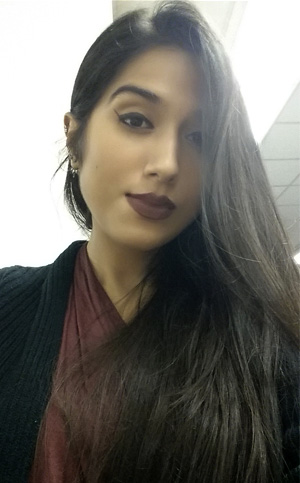
Hometown: New York City, New York
Undergraduate: BA in Biochemistry, CUNY Hunter College
Can you tell me a little about yourself before you came to Drexel?
Growing up in a Bangladeshi family, I have always been told that I would be a doctor. My parents come from a region of the world where there is often a lack of access to health care at times of medical crisis. Fortunately for me, I have always been fascinated by biological processes that occur within the body. Along my educational journey, which was heavily geared toward science, I stumbled upon the love of talking to people and making them smile through my professional experiences. The passion of making people feel good and my interests in health sciences made the medical field seem like a fitting career path. However, I lacked understanding of what it meant to be a health care provider and the confidence that the role necessitates. After having graduated from Hunter College, I worked as a medical scribe with City MD, which gave me the opportunity to personally care for patients and have exposure to a vast number of talented physicians.
When did you know that you wanted to go into medicine?
Throughout my undergraduate career, I found it difficult to pursue medicine with vigor because I couldn’t picture myself as the person who could adequately care for a patient in a life-threatening circumstance. At City MD, I was an integral team member in the practice of emergency medicine for multiple cases in which patients came in with critical conditions. Though my fear was immense with each and every patient in distress, my want to do everything in my ability to make sure the patient was safe and stable was enough to keep me going. I realized when wanting to save patients, fear would always be a part of the equation. But the desire to do all that it takes to be there for them was enough for me to always push forward and ultimately be the right person for the job.
Why did you choose to apply to Drexel’s Interdisciplinary Health Sciences (IHS) program?
I chose to apply to Drexel’s Interdisciplinary Health Sciences program because it offered to bolster my overall application to medical school in a holistic manner. I needed a program that would bolster my GPA, assist me in performing higher on the MCAT and give me research experience. Medical providers at City MD also spoke highly of pre-medical/pre-health programs in Drexel University.
How is the program going so far?
This program is going much better than I imagined. I love every single faculty member that I’ve been acquainted to thus far. They all collaborate and give you the individualized attention you need to succeed. They don’t let you fall through the cracks. Whenever I’ve had a rough patch, both my professors and advisers have reached out to me, maintaining an open-door policy. Whenever I’ve gone over my exams with my professors, they focused on the causes of my shortcomings and gave me very personalized advice that genuinely helped me improve with each consecutive exam. My experiences in the Interdisciplinary Health Sciences program helped me grow in numerous ways. It has made me: a student with an in-depth knowledge of biomedical sciences, a professional with more cultivated interpersonal and communication skills, and an overall stronger applicant for medical school.
Can you describe any research that you have been doing?
I have been working in Dr. Van Bockstaele’s laboratory on various projects with Dr. Reyes. One of the projects I worked a little more extensively on involved the localization of 5HT3 serotonin receptors on noradrenergic neurons within the locus coeruleus. The establishment of these specific serotonin receptors on neurons of the primary norepinephrine-secreting body within the brain would imply a direct causal relationship between the effects of serotonin on norepinephrine secretion by the locus coeruleus. This information is vital to pharmaceutical development in diseases such as depression. In pharmaceuticals, it is imperative to understand if agents, such as serotonin, function through direct effects or through the production of intermediates, which must be accounted for when developing treatments.
Are you involved in any extracurricular activities?
I am a tutor of 7th and 8th graders from the Spring Garden School with Promoting Achievement and Learning through Science (P.A.L.S.). I tutor students in math and sciences geared towards improving their outcome in their upcoming standardized exams. I was also fortunate enough to have the opportunity of being a teaching assistant for Concepts in Biochemistry and Cell Biology last semester.
What are you planning to do after you graduate?
After I graduate, I intend on taking the MCAT and applying to medical schools for the 2021 cycle. During the gap year, I intend to use my refined knowledge in biomedical sciences from the various courses available to IHS students to obtain a position within a medical setting, more advanced than my previous position as a medical scribe.
What advice do you have for students who are considering coming to Drexel’s IHS program?
The piece of advice that I would like to give prospective students considering Drexel’s IHS program is one that is rather simple but is often taken for granted. That advice would be to ask questions. Ask anything and everything that comes to mind. If you don’t have any questions, actively find some. The advisers and professors of the IHS program have offered me some of the best guidance that I have had during my academic career thus far. I have also noticed that my IHS student peers have been more than welcoming and that there is a strong sense of togetherness within the group. Science, whether it be in medical practice or within a laboratory, is at its best upon the collaboration of a multitude of perspectives.